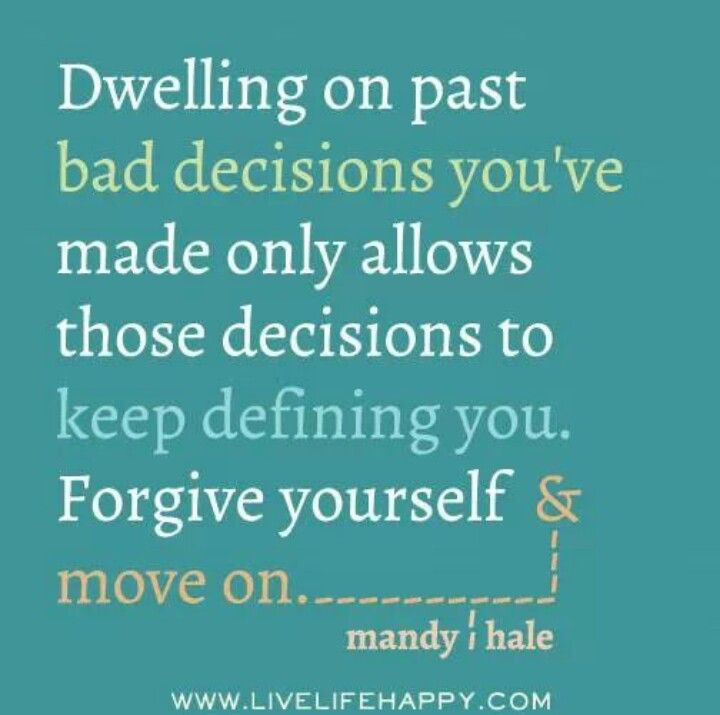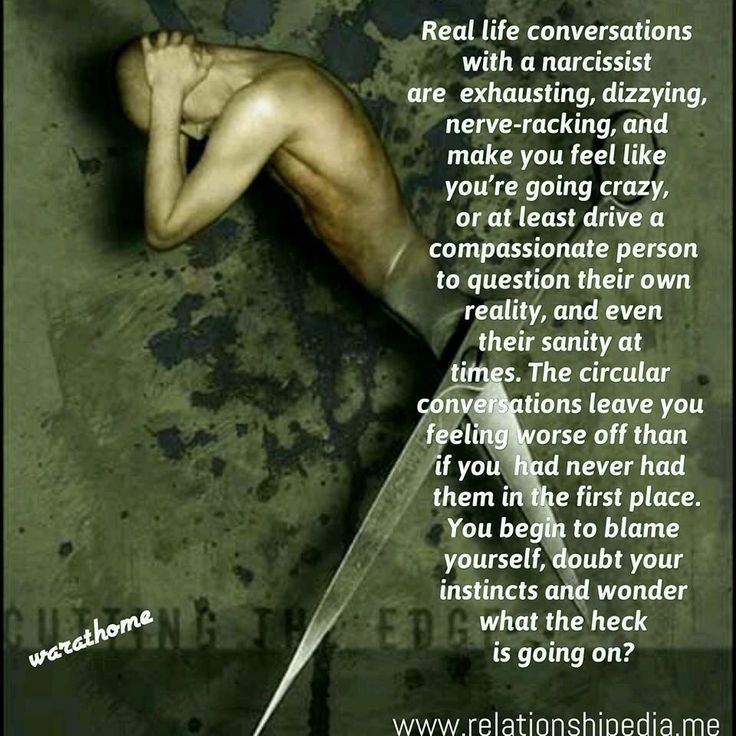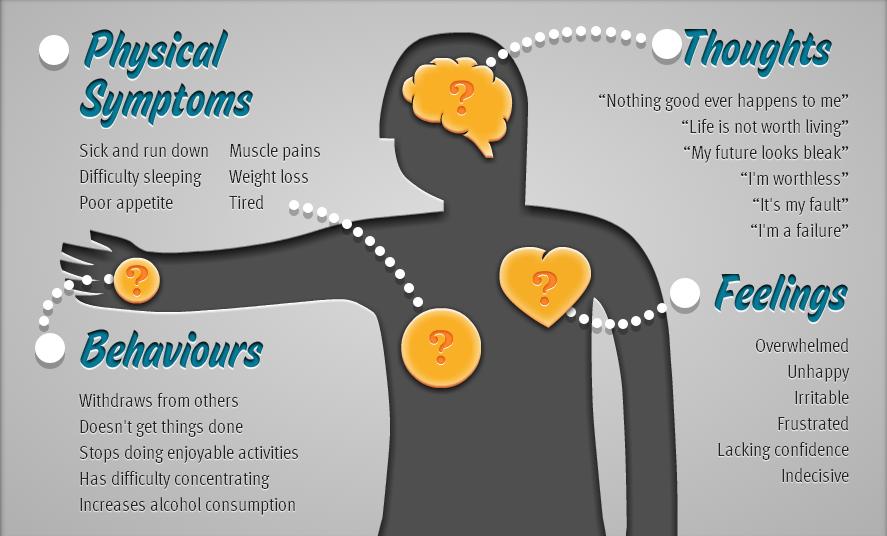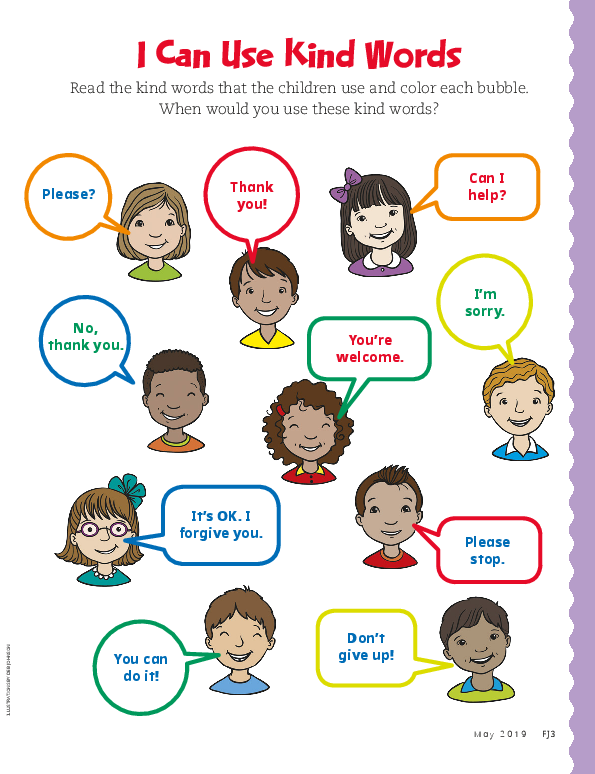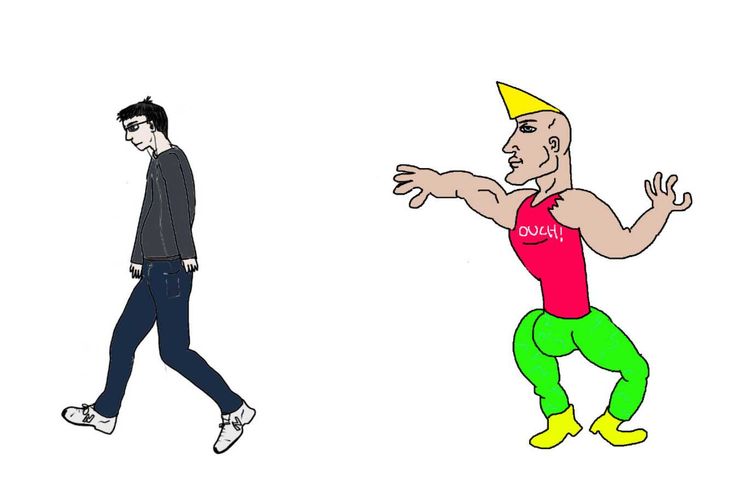Forgiveness and moving on
Is There a Difference Between Forgiving and "Moving On"?
Source: KuanShu Designs
A frequent question I receive is this: Is there a difference between forgiving and "moving on" and if so, what is the difference? It appears to be a common error in this modern era to equate the two ideas of forgiving a person for an unjust action and just letting it go and moving beyond the situation. The two are not the same.
When a person "moves on," then that person is going beyond the situation, trying to not let what happened influence emotions, thoughts, or behaviors now. When a person forgives, then that person actually is focusing on the other or others who have been unfair. To forgive is to offer a moral virtue of mercy to someone who treated the forgiver poorly. Paradoxically, rather than moving away from the situation, the forgiver moves toward the injurer through kindness, respect, generosity, or even love in the hope that the other changes. A forgiver does not necessarily reconcile if the offending other's behavior does not change and remains hurtful, but one goal of forgiving is to offer that other person a chance to make such changes.
Source: KuanShu Designs
One can "move on" with a cold indifference for the other person. The motivation in "moving on" is to look forward, to get on with one's own life, whether or not that includes the offending person. So, forgiving and "moving on" are quite different in this: When you forgive, the focus is on the other; when you "move on," the focus is on the self. It is not necessarily a selfish act to "move on." Yet, this act, by itself, is not likely to cleanse the person from a persistent resentment that can last for a very long time. It is in the reaching out to the other in forgiveness, even if reconciliation does not occur, that there is emotional healing for the one who extends the forgiveness (Enright & Fitzgibbons, 2015).
Source: KuanShu Designs
Forgiving and "moving on" are related in this way: Once a person forgives by offering goodness to those who have not been good to the forgive, this aids the forgiver in now being able to move beyond the situation without rancor, without the disquieting resentment that can be hard to diminish.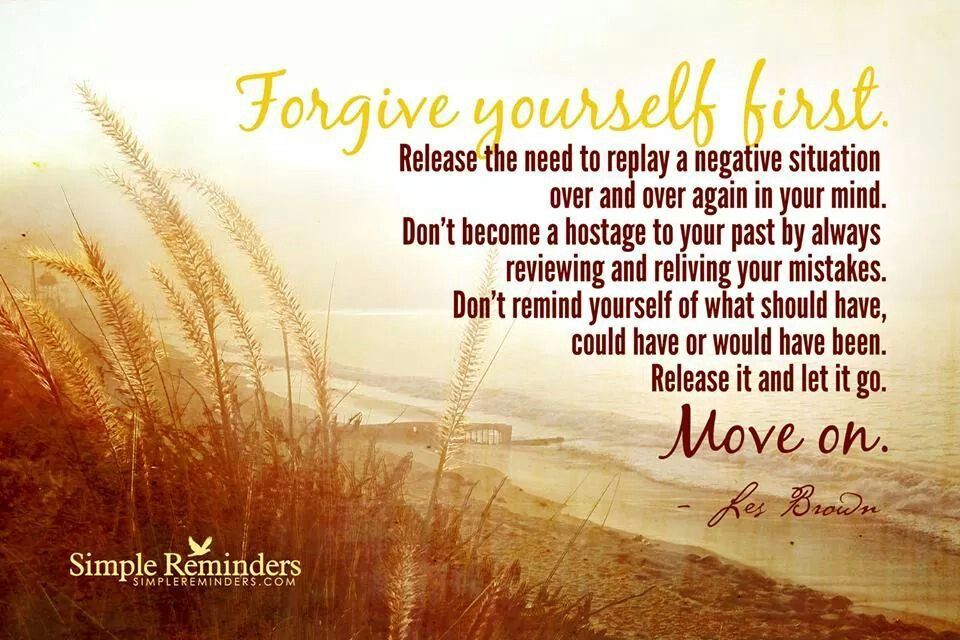 As people forgive, they now can remember in new ways. When they think about the unjust treatment, they do not burn with anger or if they do, it is more easily reduced. When they think about the situation, they might feel some sadness rather than rage, some disappointment rather than hatred.
As people forgive, they now can remember in new ways. When they think about the unjust treatment, they do not burn with anger or if they do, it is more easily reduced. When they think about the situation, they might feel some sadness rather than rage, some disappointment rather than hatred.
Forgiveness, in other words, actually helps a person "move on." On the other hand, if all a person is doing is "moving on," this will not necessarily aid forgiveness because the injured person has put out of mind what happened, which can include no longer thinking about the other, which renders the motivation to forgive---to reach out to the other---unlikely.
For people to recover from severe unjust treatment, they often need stronger medicine than "moving on." Communities need to see this and to make an important distinction between these two if people are to recover deeply and well from others' mistreatment. Forgiveness is a large part of the hope that underlies recovery in the context of unfair treatment from others.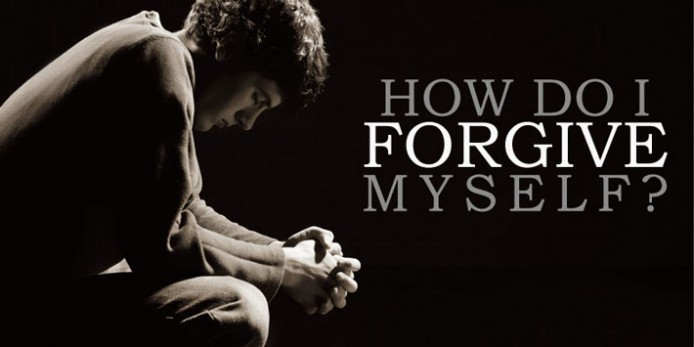
How to forgive and move on, according to a new study
Mental Health- Posted by
- Lauren Geall
- Published
Add this article to your list of favourites
New research has revealed the best way to forgive and forget – and it’s all to do with something called “emotional forgiveness”.
Making the decision to forgive someone who hurt you isn’t always easy. As much as you might like to move on, letting go of such powerful emotions can be a challenge – especially if you still feel a lot of resentment towards the person who has wronged you.
However, while you shouldn’t feel as if you owe it to someone to forgive them, taking the time to forgive someone can actually be beneficial to you, too. In fact, studies have shown that being a forgiving person can lead to a whole host of benefits including healthier relationships, lowered blood pressure and better heart health.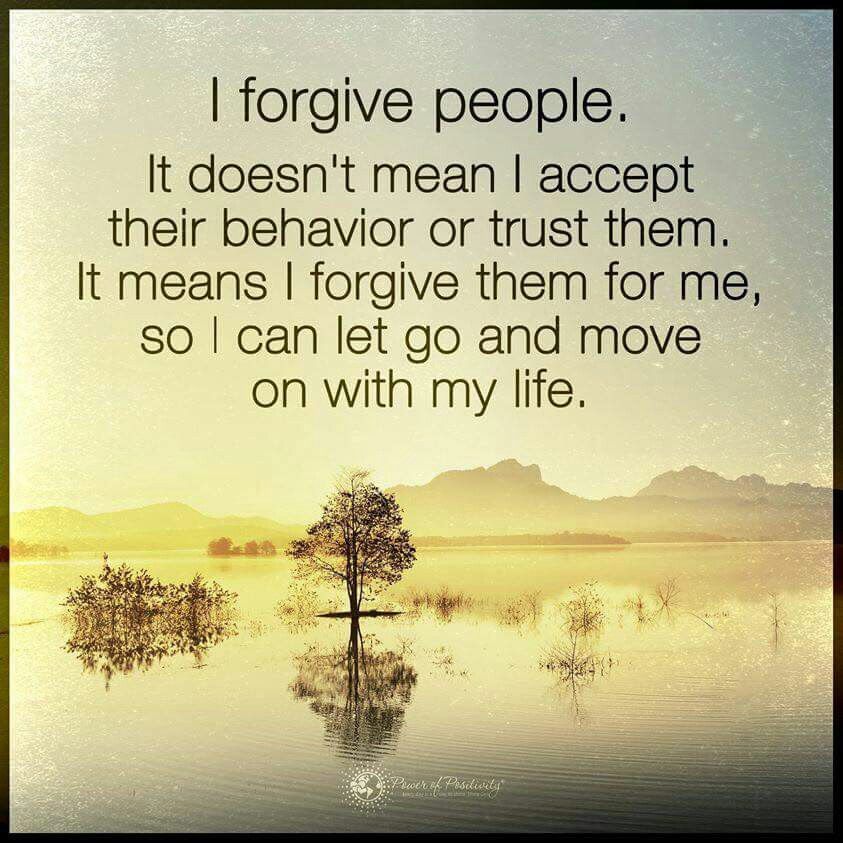
Indeed, as Megan Feldman-Bettencourt, journalist and author of the book Triumph Of The Heart: Forgiveness In An Unforgiving World, previously told Stylist: “When you hold a grudge, every time you think about that person or the situation, your brain is flooded with stress chemicals like adrenaline and norepinephrine. Over time, those chemicals put you at risk of depression and anxiety, and they inhibit your frontal lobe’s ability to solve problems.”
You may also like
Gaslighting: 3 ways to deal with a toxic relationship, according to a psychologist
To find out how different types of forgiveness can help people who are intentionally trying to forget and move on from an unpleasant experience – something which has been shown to lessen negative emotions associated with that event – the team, led by Saima Noreen at De Montfort University, focused on two ‘types’ of forgiveness: decisional and emotional.
It’s clear that, if you feel ready to forgive, it can be an effective tool to help release any negative emotions you might be holding on to.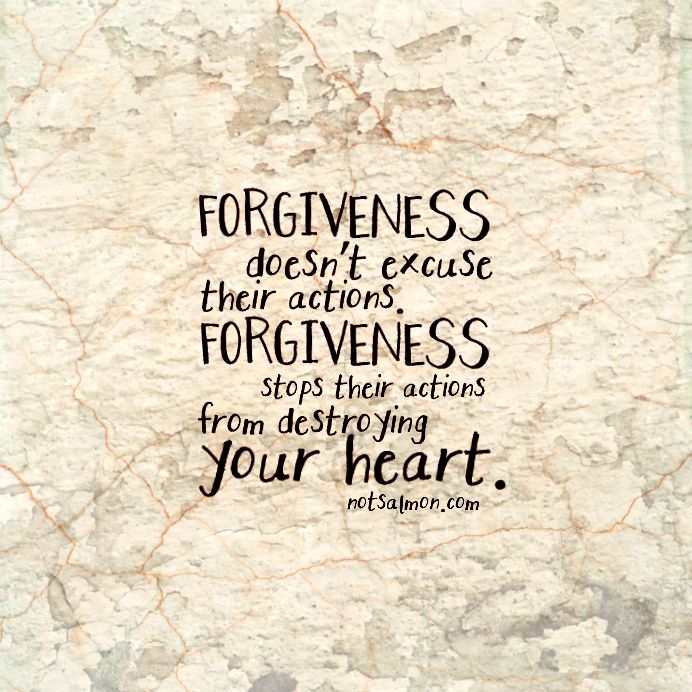 The only problem? While making the decision to forgive someone is one thing, knowing how to do that – and ending up in a place where you feel you can move on from the situation and ‘forget’ the harm you’ve suffered – is something else entirely.
The only problem? While making the decision to forgive someone is one thing, knowing how to do that – and ending up in a place where you feel you can move on from the situation and ‘forget’ the harm you’ve suffered – is something else entirely.
So, where should you start if you’re struggling to ‘forgive and forget’? According to a new study published in the Journal Of Experimental Psychology: Learning, Memory and Cognition, the answer could lie in what they term “emotional forgiveness”.
According to a new study, “emotional forgiveness” could be the key to moving on after a hurtful incident.The two differ as you might expect. While decisional forgiveness refers to a form of forgiveness in which you try to reduce your negative behaviour towards whoever has hurt you and try to restore positive behaviour towards them (meaning you may still feel emotionally hurt, but don’t act on it), in comparison, emotional forgiveness involves replacing negative emotions towards the person who has hurt you with positive ones, such as empathy, love and compassion.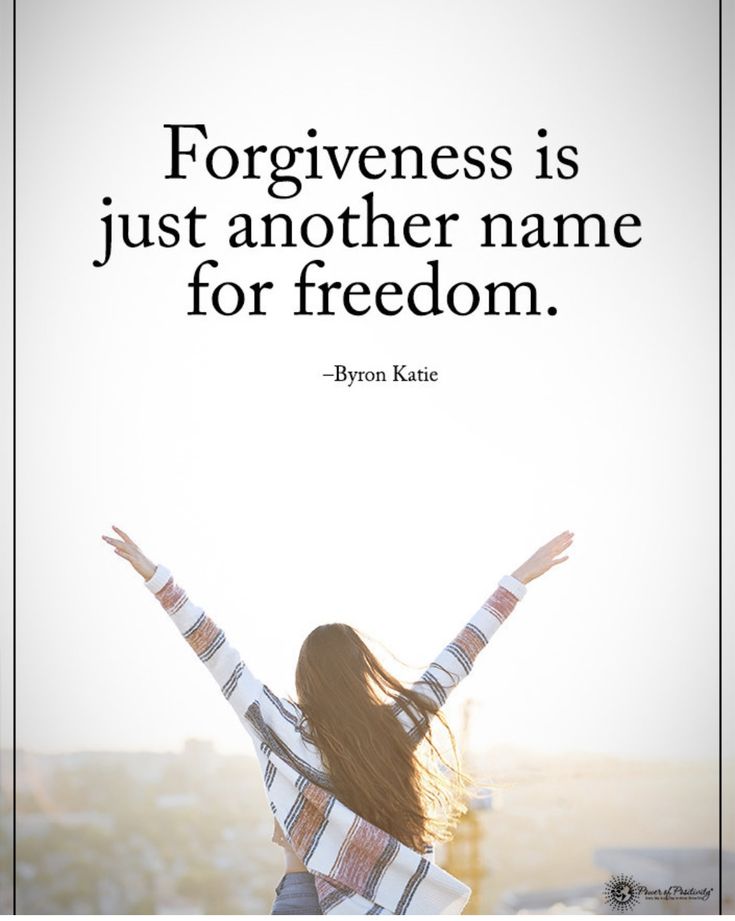
The team conducted multiple rounds of studies, varying from a group who were asked to imagine a scenario in which they had been wronged, to others who were asked to reflect on a real-life situation in which they had been hurt and been left feeling angry or resentful. In both cases, those who engaged in emotional forgiveness were able to forget more of the detail of the incident, though they still remembered the gist of it.
You may also like
How to overcome a fear of judgement and show your true self, according to an expert
In this way, the study suggests, emotional forgiveness allows for “psychological distancing”, so you’re able to step back from what happened and see the events at “a higher and more abstract level”. In turn, this allows you to experience even more emotional forgiveness, so you can continue to move on.
Although forgiveness isn’t an exact science, it’s clear that trying to understand where an offender is coming from – and approach their wrongdoing with a sense of compassion – can make a big difference when it comes to your ability to move on.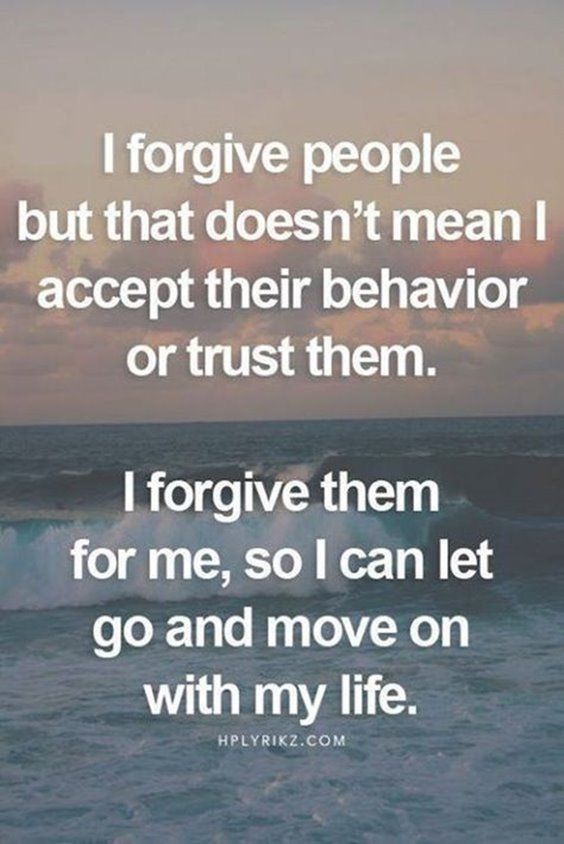
Of course, you don’t owe anyone forgiveness, and if you don’t feel ready to move on from someone or something that has hurt you, that’s OK. However, if you do feel ready, engaging in some emotional forgiveness could be a pretty good place to start.
Sign up for the latest news and must-read features from Stylist, so you don't miss out on the conversation.
Enter your email addressBy entering my email I agree to Stylist’s Privacy Policy
Images: Getty
Topics
- Forgiveness
- Psychology
Share this article
Author
Lauren Geall
As Stylist’s digital writer, Lauren Geall writes on topics including mental health, wellbeing and women’s issues. She’s also a big fan of houseplants and likes to dabble in film and TV from time-to-time. You can find her on Twitter at @laurenjanegeall.
How to forgive yourself for mistakes and move on
September 16, 2022 Life
Learn to distinguish "good" mistakes from "bad" ones and turn regrets into invaluable lessons.
None of us can change the past, no matter how much we would like to. Therefore, we learn to live with obsessive thoughts “I wonder what would happen if…” and try to get used to the constant regret that accompanies our every mistake.
The approach of psychologists Shelley Carson and Ellen Langer, who divide mistakes into “good” and “bad”, will help to cope with such a rush of emotions. They differ only in our reaction - we learn from the "good" ones, and we are desperately ashamed of the "bad" ones.
To identify your "bad" mistakes, do one simple task - continue the phrase "I'm sorry that ...". This way you will know what regrets to work with. And to turn “bad” mistakes into “good” ones, use five basic strategies.
1. Accept joys and difficulties equally
To change the perception of events that occur in our lives, we need to look into ourselves. This is where mindfulness management comes in handy.
Focus on your breath or try any other meditation practice that you enjoy.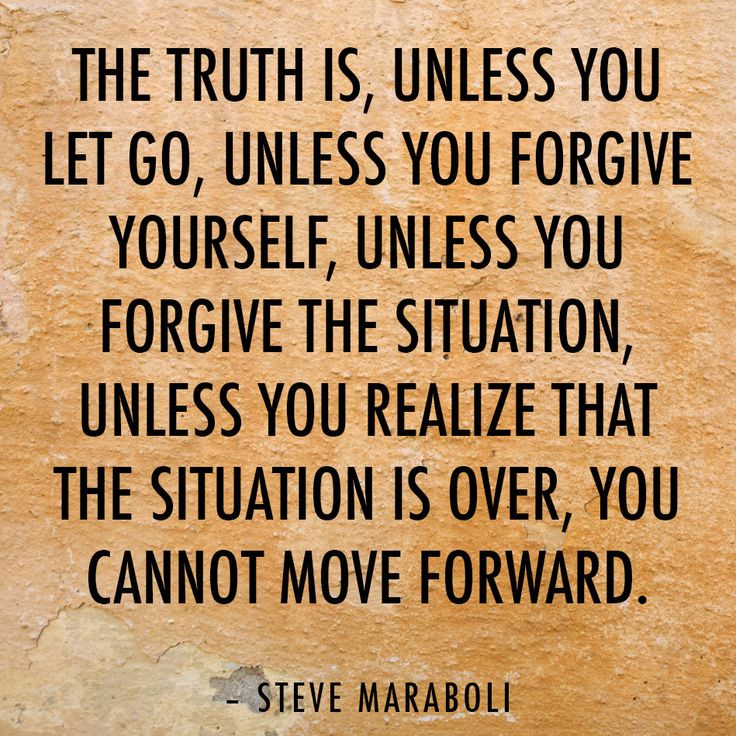 Listen to your thoughts and feelings, accept what is happening in your life and consider possible scenarios. Yes, you cannot change the past, but you can choose the future.
Listen to your thoughts and feelings, accept what is happening in your life and consider possible scenarios. Yes, you cannot change the past, but you can choose the future.
2. Be kind to yourself
Author of the book Self-Compassion. About the power of compassion and kindness to yourself ”Christine Neff is sure that it is self-compassion that helps to accept yourself. She suggests trying a practice that combines inner strength and self-love.
To do this, ask yourself two important questions:
- How can I show self-compassion when dealing with my mistakes?
- How to give yourself the opportunity to think about the current situation and draw the necessary lessons from it?
The answers will help you understand how to work through past mistakes without blaming yourself.
3. Study yourself
To do this, try asking yourself leading questions:
- What can I learn from this experience?
- If I were in that situation again, what would I do differently? How would you change yourself?
- What do I need to learn to make the right decision next time?
- What advice would I give to someone in the same situation?
- What thoughts, habits, or character traits do I need to work on to avoid making the same mistake again?
4.
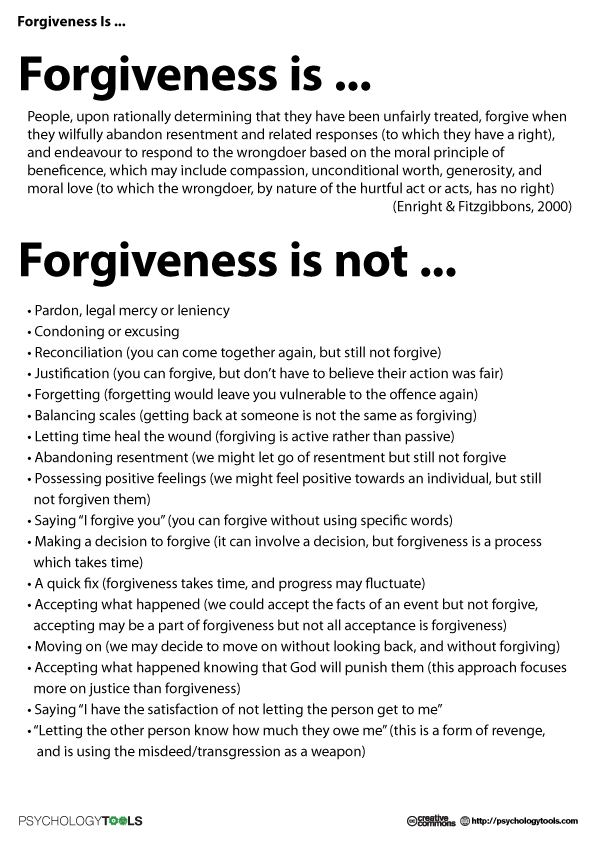 Determine what you can and cannot change
Determine what you can and cannot change Not all mistakes can be corrected. Sometimes the worst has already happened, and the only thing you can do is to accept it. Ask yourself if you can make a difference. Just be honest with yourself: is what happened just one unfortunate mistake or a whole chain of reckless decisions?
"We can't choose the cards we're dealt, but we can choose how we play them," says Carnegie Mellon University professor Randy Pausch.
If your mistake hurt another person, try not just to apologize, but to listen to him. After that, you can share your thoughts and tell what this situation has taught you and what you plan to do next.
Randy Pausch identified three important parts of any apology:
- Mentioning what you did wrong.
- Apology for causing pain.
- Question about what can be done to improve the situation.
5. Motivate Yourself
Find an inspirational phrase that will help you move on through difficult times.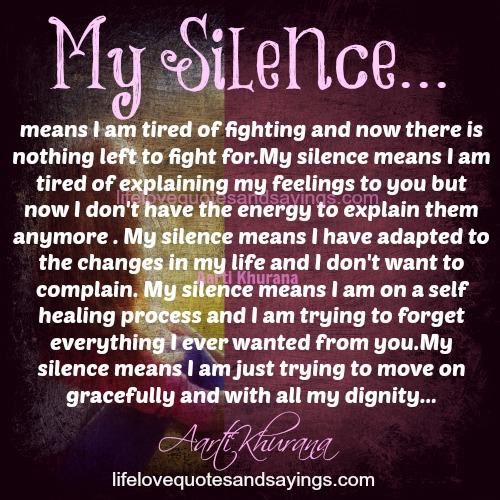 You can repeat it to yourself or make it a screensaver on your phone - as long as it makes you feel better.
You can repeat it to yourself or make it a screensaver on your phone - as long as it makes you feel better.
For believers, and perhaps not only them, the prayer of the German theologian Karl Etinger will suit: “Lord, give me peace to accept what I cannot change, give me the courage to change what I can change, and give me wisdom distinguish one from the other."
Read also 🧐
- Why we blame people for other people's mistakes, but circumstances for our own
- 7 mistakes in life that anyone can make
- Why is it so hard to admit your mistakes and what to do about it
How to survive a divorce and move on?
In one of the chapters of the book “Radical Forgiveness. 25 Practical Applications, Colin Tipping provides the keys to get through divorce and move on, leaving anger and negative energy in the past.
“The more Radical Forgiveness work is done, the more you manage to bring expanded consciousness into the situation, the better the outcome will be and the sooner you will be able to find a new life partner, if this is still an attractive offer for you.
I won't say much about the process by which you manifest a new partner using the Law of Attraction. I am referring mainly to Radical Manifestation, a technique detailed in my book of the same name.
I think you should take another look at the sections of this book on assessing an existing relationship (app. 13) and reconciling with a partner (app. 14). Use all the information received when building relationships in the future. To better explain the essence of the process, I would like to offer you four rules from my book " Radical Love " that you should learn before you do anything to create a new relationship.
Rule 1. There must be a significant amount of time between the completion of one relationship and the creation of the next.
Ending relationships on an energy level takes much longer than you think, especially if they were deep and long, and even more so if the breakup was painful. The problem is further exacerbated by the presence of children.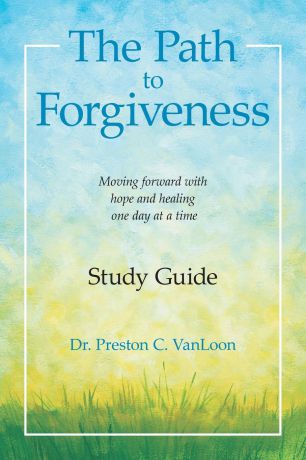 If you rush headlong into a new relationship, chances are you will take all the unresolved issues of the old ones with you and recreate the same dynamic that led to the breakup.
If you rush headlong into a new relationship, chances are you will take all the unresolved issues of the old ones with you and recreate the same dynamic that led to the breakup.
Of course, I understand that often the impetus for a breakup is just the fact that you met another person and fell in love with him. In this case, a new relationship was formed before the old one was terminated. But even then, it would be wiser to live apart for some time, and only then move in with a new partner. I recommend that you spend at least six months alone, and preferably a year, for reasons that I will point out below when we get to Rule 4.
The desire to find a new partner as soon as possible is characteristic primarily of men, and they are often in a hurry to make commitments earlier than common sense requires. Even more a man fusses when he needs a mother for his children. Therefore, he often demands from the chosen one that she immediately move to live with him, and she has to defend the right to be alone with herself for as long as she needs. If he refuses her such an opportunity, then this should serve as an alarm signal. He probably doesn't deserve her attention.
If he refuses her such an opportunity, then this should serve as an alarm signal. He probably doesn't deserve her attention.
Even if it's been years since you broke up and you've been planning to build new ones for some time, you may still need to work on forgiving your previous partner. It is likely that the energy left over from that relationship is preventing you from attracting a new person.
Rule 2. Do the work of forgiving the previous partner before you start trying to attract a new one.
And it's not just about filling out one form of Radical Forgiveness. Fill them in one by one, or go more intense with the 21-Day Forgiveness Program until all residual energy is gone from the situation: anger, resentment, jealousy, pain, regret.
Obviously, this will take some work, but if you want a new relationship to have a future, then it is extremely important to get rid of these energies. Therefore, you need to spend a lot of time alone with yourself and figure out who you really are before you start building relationships with a new person. There are a large number of people who have never lived alone, and therefore have no idea who they are apart from another person. How are you going to grow in the direction of Love if you don't know who you are and feel your own incompleteness without a partner?
There are a large number of people who have never lived alone, and therefore have no idea who they are apart from another person. How are you going to grow in the direction of Love if you don't know who you are and feel your own incompleteness without a partner?
Rule 3: Be clear about what you want and don't want in a relationship.
As mentioned in the introduction to this chapter, to make this task easier for you, you should refer to applications 13 and 14, and to study it more deeply, read the book " Radical Love ".
Make a comprehensive list of what you want and don't want. Think carefully about what qualities you want to see in this person. Take the time and effort to figure out what is most important to you in a relationship?
Rule 4: Watch your partner for at least six months before making a commitment. Become a detective.
At first, the person you are trying to attract into your life may seem like the epitome of perfection.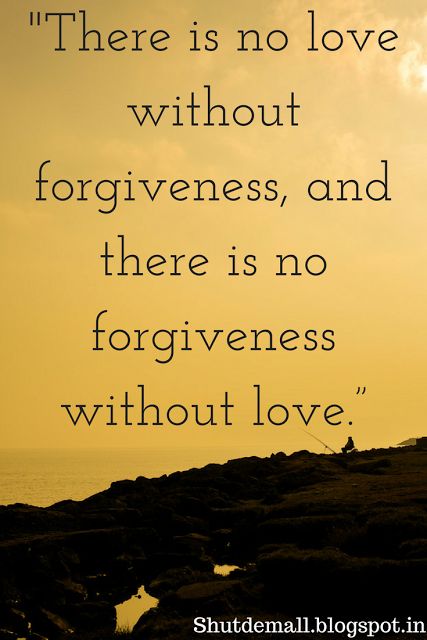 The problem is that as soon as you reach a certain level of intimacy with a partner and become attached to him, the true face of a man or woman, previously hidden under a mask, will begin to appear. Suddenly it turns out that this person is the exact opposite of what you originally thought about him. You have no idea how many times I have heard stories about how people find their "soul mate" - an ideal partner, caring and loving, but six months pass - and he turns into a tyrant. Why this happens, there is a certain explanation, but this is another story. Just be aware that this happens all the time.
The problem is that as soon as you reach a certain level of intimacy with a partner and become attached to him, the true face of a man or woman, previously hidden under a mask, will begin to appear. Suddenly it turns out that this person is the exact opposite of what you originally thought about him. You have no idea how many times I have heard stories about how people find their "soul mate" - an ideal partner, caring and loving, but six months pass - and he turns into a tyrant. Why this happens, there is a certain explanation, but this is another story. Just be aware that this happens all the time.
Therefore, if you start dating someone, be aware of the possibility of such a development and do not enter into a full-fledged relationship until you feel comfortable enough with each other to show your true colors. Notice any changes in your partner's behavior. At first, they can be barely noticeable, but breakdowns happen with everyone - and from them you will understand what to expect in the future.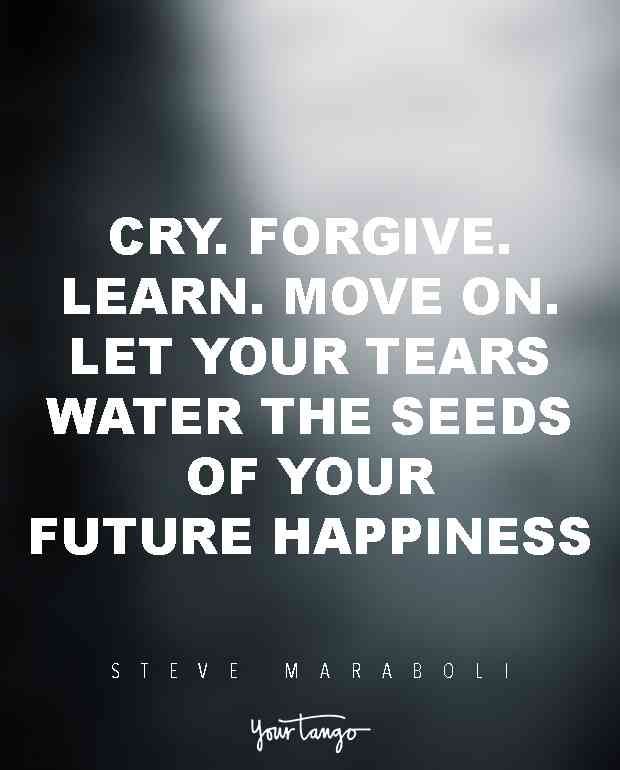
One of my clients, having experienced this “personality change” a couple of times, decided that it would never happen again. She called the ex-wife of her new partner and asked what he was like deep inside. She gladly told her about everything - both the bad and the good. My client learned a lot from her and they became friends. She married this man and everything worked out well for them. This is a risky strategy, but there is no other way to find out about the secret sides of a potential partner. You can only recognize a person by living with him for some time, so it makes sense to ask someone who has already gone through this experience about him, and only after that take the risk.
There are three possible reactions to the transformation of a "soulmate" into a tyrant:
a) Immediately end the relationship as soon as you see that the partner's changed behavior violates your boundaries and contradicts your values.
b) Give your partner a trial period and see if the pattern of behavior you discover will disappear after you do some work on Radical Forgiveness (primarily to clear your own energy), clearly define your boundaries and explain what you want, and what is not.
However, a dangerous trap lies in wait for you here: you can imagine that it is in your power to remake a person. This is wrong. Very often, women say to themselves: "If I love this man enough, he will change and become the way I want." This does not happen, so it is better to immediately abandon this strategy.
Therefore, this option is only suitable if you are ready to observe changes in your partner's behavior over a period of 12 months. If during this time the unwanted behavior does not completely disappear, then your relationship is potentially dysfunctional and you should consider ending it.
c) The third option is to leave everything as it is. Perhaps your need for a relationship is so strong that you are ready to put up with everything, as long as the person stays with you. This option is acceptable only if you intend to experience even more pain and suffering.
The experience of divorce definitely gives us a lot to learn. The lessons we have to learn are already contained in the very dynamics of family life.